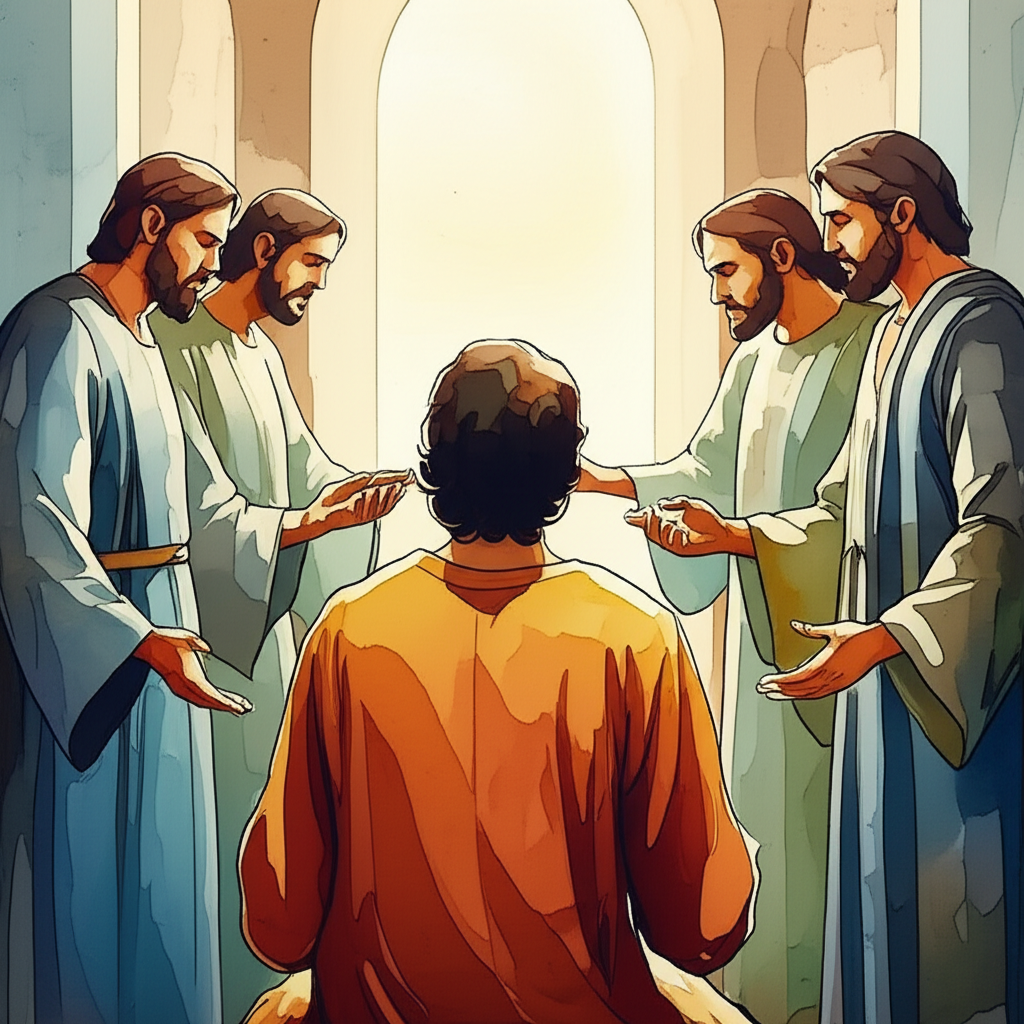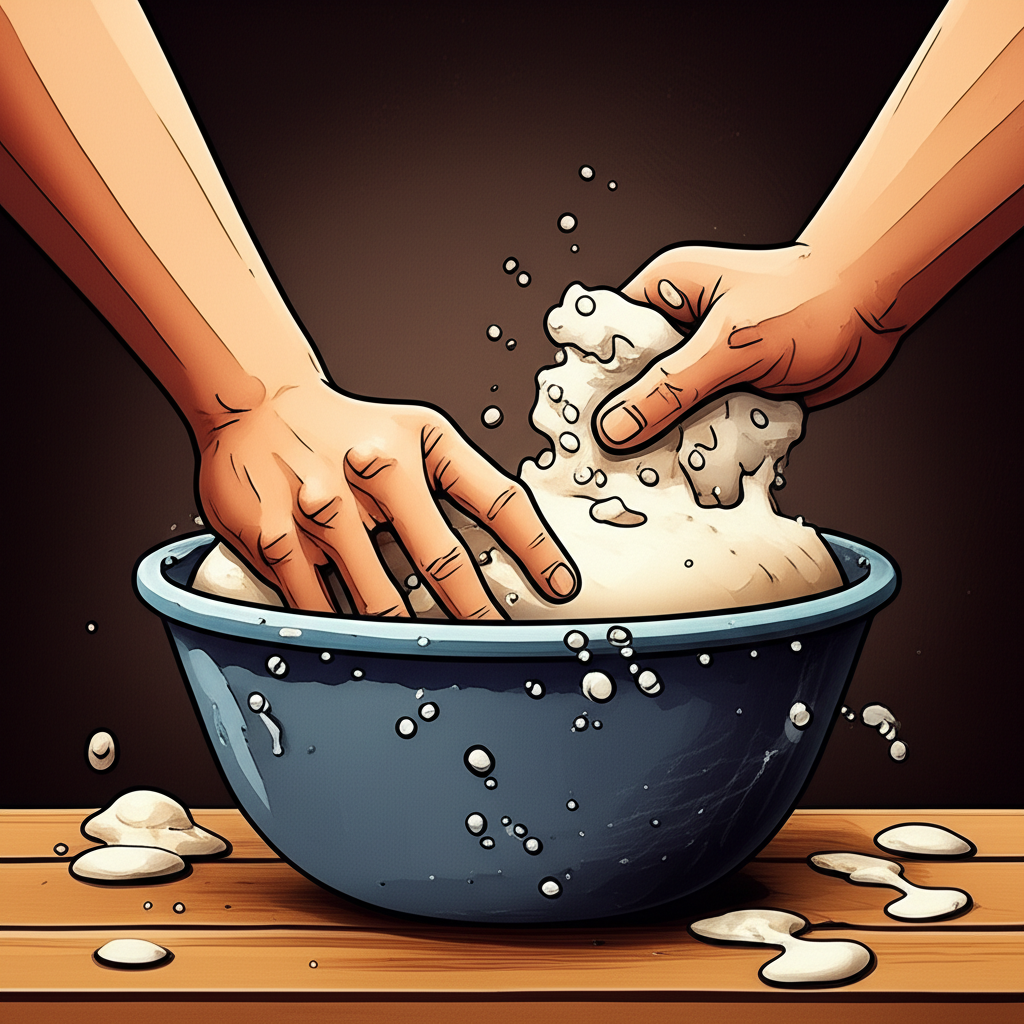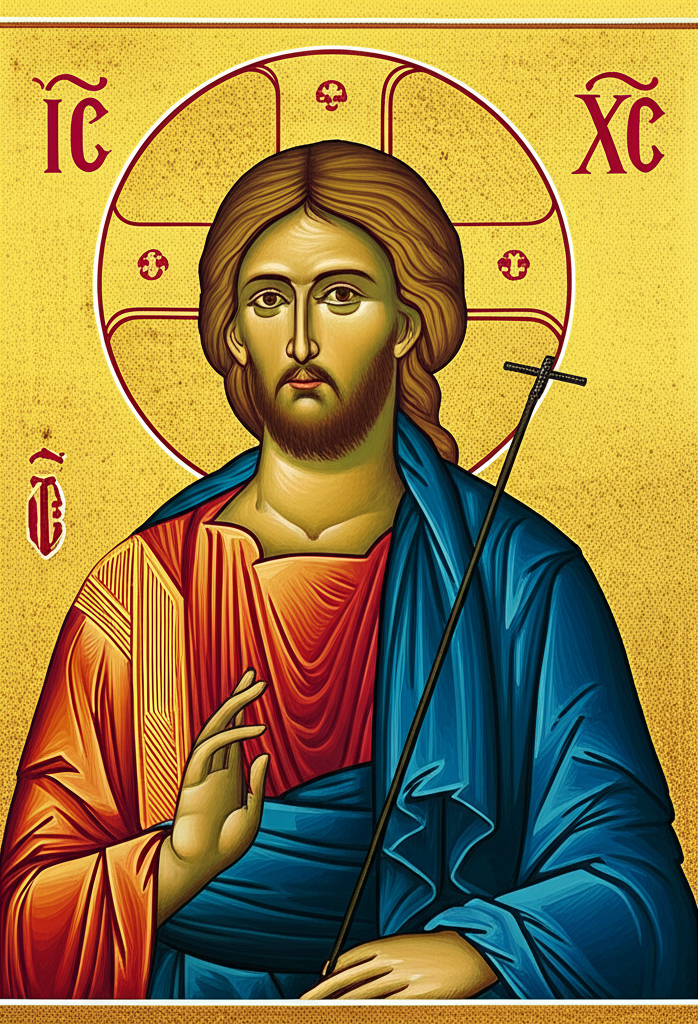1 Corinthians 5 meaning explained in AI Summary
This chapter addresses a specific case of egregious sin within the Corinthian church and outlines the appropriate response.
The Situation:
- Serious Sexual Immorality (v. 1-2): Paul confronts the church for tolerating a case of sexual immorality so severe that even non-believers would find it appalling. This likely involved a man living with his father's wife.
- Inaction and Arrogance (v. 2): Instead of mourning and taking action, the Corinthians were proud, demonstrating a shocking lack of concern for the gravity of the sin and its impact on the community.
Paul's Instructions:
- Expel the Wicked Person (v. 3-5): Paul instructs the church to immediately expel the man from their fellowship. This "handing over to Satan" signifies removing his protection and blessings as a member of Christ's body, hoping for repentance and restoration.
- The Leaven Analogy (v. 6-8): Paul uses the analogy of leaven (yeast) to illustrate the danger of allowing sin to remain unchecked. Just as a small amount of leaven can affect the whole batch of dough, so too can sin corrupt the entire community.
- Purity and Separation (v. 9-13): Paul clarifies that his previous instructions about avoiding immoral people referred to unbelievers in the world, not those within the church. Christians are called to judge and remove those who claim to be believers but live in open, unrepentant sin.
Key Themes:
- Church Discipline: This chapter emphasizes the importance of church discipline, not as punishment, but as a loving act to restore the sinner, protect the community, and maintain the holiness of the church.
- Holiness and Purity: The church is called to be distinct from the world, reflecting God's holiness in its conduct and relationships. Tolerating sin undermines this witness.
- Repentance and Restoration: While expulsion is necessary, the ultimate goal is the sinner's repentance and restoration to fellowship.
Overall, 1 Corinthians 5 serves as a sobering reminder of the destructive nature of sin and the importance of maintaining purity and accountability within the Christian community.
1 Corinthians 5 bible study ai commentary
Paul confronts the Corinthian church's arrogant tolerance of gross sexual immorality in its midst. He commands them to practice church discipline by removing the unrepentant man from their fellowship. This action, likened to cleansing leaven before Passover, is not merely punitive but redemptive for the sinner and essential for protecting the purity of the church community. Paul clarifies that this judgment applies to those inside the church, not outsiders, thereby establishing the principle of accountability within the body of Christ.
1 Corinthians 5 Context
The city of Corinth was a bustling Roman port, infamous for its cosmopolitan lifestyle and rampant sexual immorality. The temple of Aphrodite, with its rumoured one thousand temple prostitutes, epitomized this culture. New Corinthian believers struggled to separate from this pervasive pagan mindset. Their pride, a recurring theme in the epistle, led them to misinterpret Christian freedom, viewing their tolerance of severe sin as a sign of spiritual enlightenment rather than a dangerous compromise that threatened the entire community's health and witness.
1 Corinthians 5:1
It is actually reported that there is sexual immorality among you, and of a kind that is not tolerated even among pagans, for a man has his father's wife.
In-depth-analysis
- "Actually reported": The sin was public knowledge and a scandal. Paul's tone conveys shock and dismay that this is common talk.
- "Sexual immorality": The Greek word is porneia (πορνεία), a general term for any illicit sexual activity outside of marriage. It is the root of the word pornography.
- "Not tolerated even among pagans": Paul highlights the extreme nature of the sin. While Corinth was permissive, incest was taboo even in Roman law and gentile culture. The church was tolerating something the world condemned.
- "Has his father's wife": This refers to an ongoing relationship with his stepmother, possibly after his father's death or divorce. This was a direct violation of Old Testament law.
Bible references
- Leviticus 18:8: "You shall not uncover the nakedness of your father’s wife; it is your father’s nakedness." (The direct OT prohibition).
- Deuteronomy 27:20: "'Cursed be anyone who lies with his father's wife...' And all the people shall say, 'Amen.'" (Shows the severity of the sin in Israel).
- Genesis 35:22: "While Israel lived in that land, Reuben went and lay with Bilhah his father's concubine. And Israel heard of it." (An early biblical example of this transgression).
Cross references
Amos 2:7 (condemnation of father and son with same girl); Deut 22:30 (prohibition of marrying father's wife); 2 Sam 16:21-22 (Absalom and David's concubines).
1 Corinthians 5:2
And you are arrogant! Ought you not rather to mourn? Let him who has done this be removed from among you.
In-depth-analysis
- "Arrogant": The Greek physioō (φυσιόω) means "puffed up." This is the central problem for Paul—not just the sin, but the church's proud and permissive attitude. They may have viewed their tolerance as spiritual maturity or an expression of "freedom."
- "Ought you not rather to mourn?": The proper response to such egregious sin in the community is grief (pentheō), the same word used in the Beatitudes (Matt 5:4). It signifies a deep sorrow over the offense to God and the spiritual danger to both the individual and the church.
- "Be removed": This is the required action. The passive voice implies it is a community responsibility to enact this removal (excommunication).
Bible references
- 2 Corinthians 7:10: "For godly grief produces a repentance that leads to salvation... but worldly grief produces death." (Contrasts the right and wrong kind of sorrow).
- Ezra 9:3: "As soon as I heard this... I tore my garment and my cloak and pulled hair from my head and beard and sat appalled." (The proper response of a leader to community sin).
- Matthew 5:4: "Blessed are those who mourn, for they shall be comforted." (Highlights mourning as a spiritual virtue).
Cross references
Jas 4:9 (lament over sin); 2 Cor 12:21 (Paul fears finding unrepentant sin); Neh 1:4 (Nehemiah mourns for Jerusalem).
1 Corinthians 5:3-5
For I, though absent in body, am present in spirit; and as if present, I have already pronounced judgment on the one who did such a thing. When you are assembled in the name of the Lord Jesus and my spirit is present, with the power of our Lord Jesus, you are to deliver this man to Satan for the destruction of the flesh, so that his spirit may be saved in the day of the Lord.
In-depth-analysis
- "Present in spirit": Paul asserts his apostolic authority, bridging his physical absence. His judgment is not merely his opinion but is divinely sanctioned.
- "Assembled in the name of the Lord Jesus": This is not a casual gathering but the formal assembly of the church, acting with Christ's authority.
- "Deliver this man to Satan": This phrase (paradidōmi tō Satana) means excommunication—expelling the person from the spiritual protection and fellowship of the church into the world, which the Bible describes as Satan's domain (1 John 5:19). It is not a curse but a disciplinary action.
- "For the destruction of the flesh": The goal is not the person's physical death, but the death of his rebellious, sinful nature ("the flesh"). This process of being outside the church's covering could involve hardship, leading him to confront his sin and repent.
- "So that his spirit may be saved": This is the ultimate, redemptive purpose of the discipline. The aim is restoration, not final condemnation. The harsh measure is a form of spiritual surgery to save his soul.
Bible references
- 1 Timothy 1:20: "...among whom are Hymenaeus and Alexander, whom I have handed over to Satan that they may learn not to blaspheme." (Another example of Paul using this apostolic discipline).
- Matthew 18:17-18: "If he refuses to listen even to the church... you have the authority on earth to bind and loose." (Jesus outlines the final step of church discipline).
- 2 Corinthians 2:6-8: "For such a one, this punishment by the majority is enough... you should rather turn to forgive and comfort him..." (Likely refers to this same man after he repented, showing the redemptive goal was achieved).
- Job 2:6: "And the Lord said to Satan, 'Behold, he is in your hand; only spare his life.'" (An OT parallel where God allows Satan to afflict someone for a higher purpose).
Cross references
Luke 22:31 (Satan sifts Peter); Acts 26:18 (turning from the power of Satan to God); Zech 3:2 (The Lord rebuke you, Satan!).
Polemics
Scholars note this is not an eternal damnation. It's a therapeutic, albeit severe, measure. By removing the person from the community of grace, the hope is that the suffering and isolation experienced in "Satan's realm" (the world) will break their pride and sin's power, leading them back to God. This contrasts with gnostic beliefs that may have celebrated freedom from physical or moral constraints.
1 Corinthians 5:6
Your boasting is not good. Do you not know that a little leaven leavens the whole lump?
In-depth-analysis
- "Boasting is not good": Paul directly rebukes their pride. Their "puffing up" (v. 2) over their supposed tolerance is spiritually destructive.
- "A little leaven": Leaven (zymē, ζύμη) is almost always a symbol of sin, corruption, or false teaching in Scripture. Like yeast, sin seems small but quietly and pervasively corrupts the entire community if left unchecked.
Bible references
- Galatians 5:9: "A little leaven leavens the whole lump." (Paul uses the exact same proverb to warn against the corrupting influence of legalistic false teaching).
- Matthew 16:6: "Jesus said to them, 'Watch and beware of the leaven of the Pharisees and Sadducees.'" (Leaven as a metaphor for corrupting doctrine and hypocrisy).
- Exodus 12:15: "Seven days you shall eat unleavened bread. On the first day you shall remove leaven out of your houses..." (The original context for the metaphor).
Cross references
Mark 8:15 (beware of the leaven of Herod); Luke 12:1 (leaven as hypocrisy).
1 Corinthians 5:7-8
Cleanse out the old leaven that you may be a new lump, as you really are unleavened. For Christ, our Passover lamb, has been sacrificed. Let us therefore celebrate the festival, not with the old leaven, the leaven of malice and evil, but with the unleavened bread of sincerity and truth.
In-depth-analysis
- "Cleanse out the old leaven": A direct command based on the Passover tradition of removing all leavened products (chametz) from the home. Spiritually, this means decisively dealing with sin.
- "A new lump... you really are unleavened": Paul mixes indicative and imperative. In Christ, their identity is "unleavened" (positional purity). Therefore, they must live like it (practical purity).
- "Christ, our Passover lamb": This is a foundational christological statement. Jesus is the fulfillment of the Passover lamb (Exodus 12), whose sacrificial death delivers believers from the angel of death (divine judgment).
- "Celebrate the festival": The Christian life is a continuous festival of deliverance. This life is to be lived with "sincerity" (eilikrineia—purity, genuineness) and "truth" (alētheia), not "malice" (kakia) and "evil" (ponēria).
Bible references
- Exodus 12:5: "Your lamb shall be without blemish, a male a year old..." (The description of the Passover lamb, pointing to Christ's perfection).
- John 1:29: "The next day he saw Jesus coming toward him, and said, 'Behold, the Lamb of God, who takes away the sin of the world!'" (John the Baptist's identification of Jesus).
- 1 Peter 1:19: "...but with the precious blood of Christ, like that of a lamb without blemish or spot." (Reinforces the imagery of Christ as the perfect sacrifice).
Cross references
John 19:36 (scripture fulfilled: "not one of his bones will be broken," referencing the Passover lamb); Rev 5:12 (Worthy is the Lamb who was slain); Isa 53:7 (He was led like a lamb to the slaughter).
1 Corinthians 5:9-11
I wrote to you in my letter not to associate with sexually immoral people—not at all meaning the sexually immoral of this world, or the greedy and swindlers, or idolaters, since then you would need to go out of the world. But now I am writing to you not to associate with anyone who bears the name of brother if he is guilty of sexual immorality or greed, or is an idolater, reviler, drunkard, or swindler—not even to eat with such a person.
In-depth-analysis
- "My letter": Paul refers to a previous, now lost, letter to the Corinthians. This verse is key evidence of a wider correspondence than we possess.
- Clarification: The church misunderstood his earlier instruction, thinking it required ascetic withdrawal from society. Paul clarifies the boundary: the standard is different for believers versus non-believers.
- "Bears the name of brother": The instruction applies specifically to a professing Christian whose life blatantly and unrepentantly contradicts their confession.
- "Not to associate with": Greek synanamignymi, meaning to mix together or have intimate fellowship. This includes table fellowship ("not even to eat with"), which was a powerful sign of acceptance and unity in the ancient world.
- List of Sins: These are representative of a lifestyle, not isolated acts. They are public, ongoing, and without repentance.
Bible references
- Matthew 18:17: "And if he refuses to listen even to the church, let him be to you as a Gentile and a tax collector." (Jesus’ teaching on treating an unrepentant member as an outsider).
- 2 Thessalonians 3:14: "If anyone does not obey what we say in this letter, take note of that person, and have nothing to do with him, that he may be ashamed." (A parallel instruction on disassociation for the purpose of correction).
- John 17:15: "I do not ask that you take them out of the world, but that you keep them from the evil one." (Jesus’ prayer shows believers are to be in the world but not of it).
Cross references
Rom 16:17 (avoid those who cause divisions); Tit 3:10 (reject a divisive person); 2 John 1:10-11 (do not welcome false teachers).
1 Corinthians 5:12-13
For what have I to do with judging outsiders? Is it not those inside the church whom you are to judge? God judges those outside. “Purge the evil person from among you.”
In-depth-analysis
- Jurisdiction of Judgment: Paul draws a sharp line. The church’s responsibility for moral judgment and accountability is internal. Judging those "outside" (unbelievers) is God's role, not the church's. The church is to be a witness to the world, not its moral police.
- "Is it not those inside... whom you are to judge?": A rhetorical question emphasizing the church's duty to maintain its own holiness. This is not about condemning people's souls, but about judging behavior against God's revealed standard.
- "Purge the evil person from among you": Paul concludes by quoting directly from Deuteronomy (e.g., Deut 17:7, 22:21, 24). This phrase was the standard legal formula in the Old Testament for removing a covenant-breaker to preserve the holiness of Israel. Paul applies this principle directly to the church, the New Covenant community.
Bible references
- Deuteronomy 17:7: "...So you shall purge the evil from your midst." (One of several instances of this formula, establishing the Old Testament principle of community purity).
- 1 Peter 4:17: "For it is time for judgment to begin at the household of God; and if it begins with us, what will be the outcome for those who do not obey the gospel of God?" (Affirms that God's purifying judgment starts with His own people).
Cross references
Deut 13:5, 19:19, 21:21, 22:21, 22:24, 24:7 (repeated command to purge evil).
1 Corinthians chapter 5 analysis
- Corporate Responsibility: The primary audience for this command is the church as a body, not just its leaders. The sin of the individual became the sin of the community through their prideful tolerance. Purity is a collective responsibility.
- The Goal of Discipline: The chapter presents a threefold purpose for church discipline:
- Redemptive: To bring about the "destruction of the flesh" so the person's spirit may be saved (v. 5).
- Protective: To "cleanse out the old leaven" so it doesn't corrupt the entire church (v. 6-7).
- Witness: To uphold the holiness of God and the integrity of the church's testimony before the world.
- Church vs. World: The chapter establishes a critical theological boundary. The standards of conduct and accountability are for "those inside" (v. 12). Christians are to engage with the world compassionately, leaving judgment of non-believers to God, while maintaining rigorous standards of holiness within their own community.
1 Corinthians 5 summary
Paul castigates the Corinthian church for their prideful tolerance of a man engaged in incest. He commands them to excommunicate this unrepentant member, "handing him over to Satan" for the redemptive purpose of his ultimate salvation. Using the Passover analogy, he insists they must "cleanse out the old leaven" of sin to maintain the purity of the church, the "unleavened" community of Christ. He concludes by clarifying that this severe judgment applies only to professing believers inside the church, not to outsiders whom God will judge.
1 Corinthians 5 AI Image Audio and Video









1 Corinthians chapter 5 kjv
- 1 It is reported commonly that there is fornication among you, and such fornication as is not so much as named among the Gentiles, that one should have his father's wife.
- 2 And ye are puffed up, and have not rather mourned, that he that hath done this deed might be taken away from among you.
- 3 For I verily, as absent in body, but present in spirit, have judged already, as though I were present, concerning him that hath so done this deed,
- 4 In the name of our Lord Jesus Christ, when ye are gathered together, and my spirit, with the power of our Lord Jesus Christ,
- 5 To deliver such an one unto Satan for the destruction of the flesh, that the spirit may be saved in the day of the Lord Jesus.
- 6 Your glorying is not good. Know ye not that a little leaven leaveneth the whole lump?
- 7 Purge out therefore the old leaven, that ye may be a new lump, as ye are unleavened. For even Christ our passover is sacrificed for us:
- 8 Therefore let us keep the feast, not with old leaven, neither with the leaven of malice and wickedness; but with the unleavened bread of sincerity and truth.
- 9 I wrote unto you in an epistle not to company with fornicators:
- 10 Yet not altogether with the fornicators of this world, or with the covetous, or extortioners, or with idolaters; for then must ye needs go out of the world.
- 11 But now I have written unto you not to keep company, if any man that is called a brother be a fornicator, or covetous, or an idolater, or a railer, or a drunkard, or an extortioner; with such an one no not to eat.
- 12 For what have I to do to judge them also that are without? do not ye judge them that are within?
- 13 But them that are without God judgeth. Therefore put away from among yourselves that wicked person.
1 Corinthians chapter 5 nkjv
- 1 It is actually reported that there is sexual immorality among you, and such sexual immorality as is not even named among the Gentiles?that a man has his father's wife!
- 2 And you are puffed up, and have not rather mourned, that he who has done this deed might be taken away from among you.
- 3 For I indeed, as absent in body but present in spirit, have already judged (as though I were present) him who has so done this deed.
- 4 In the name of our Lord Jesus Christ, when you are gathered together, along with my spirit, with the power of our Lord Jesus Christ,
- 5 deliver such a one to Satan for the destruction of the flesh, that his spirit may be saved in the day of the Lord Jesus.
- 6 Your glorying is not good. Do you not know that a little leaven leavens the whole lump?
- 7 Therefore purge out the old leaven, that you may be a new lump, since you truly are unleavened. For indeed Christ, our Passover, was sacrificed for us.
- 8 Therefore let us keep the feast, not with old leaven, nor with the leaven of malice and wickedness, but with the unleavened bread of sincerity and truth.
- 9 I wrote to you in my epistle not to keep company with sexually immoral people.
- 10 Yet I certainly did not mean with the sexually immoral people of this world, or with the covetous, or extortioners, or idolaters, since then you would need to go out of the world.
- 11 But now I have written to you not to keep company with anyone named a brother, who is sexually immoral, or covetous, or an idolater, or a reviler, or a drunkard, or an extortioner? not even to eat with such a person.
- 12 For what have I to do with judging those also who are outside? Do you not judge those who are inside?
- 13 But those who are outside God judges. Therefore "put away from yourselves the evil person."
1 Corinthians chapter 5 niv
- 1 It is actually reported that there is sexual immorality among you, and of a kind that even pagans do not tolerate: A man is sleeping with his father's wife.
- 2 And you are proud! Shouldn't you rather have gone into mourning and have put out of your fellowship the man who has been doing this?
- 3 For my part, even though I am not physically present, I am with you in spirit. As one who is present with you in this way, I have already passed judgment in the name of our Lord Jesus on the one who has been doing this.
- 4 So when you are assembled and I am with you in spirit, and the power of our Lord Jesus is present,
- 5 hand this man over to Satan for the destruction of the flesh, so that his spirit may be saved on the day of the Lord.
- 6 Your boasting is not good. Don't you know that a little yeast leavens the whole batch of dough?
- 7 Get rid of the old yeast, so that you may be a new unleavened batch?as you really are. For Christ, our Passover lamb, has been sacrificed.
- 8 Therefore let us keep the Festival, not with the old bread leavened with malice and wickedness, but with the unleavened bread of sincerity and truth.
- 9 I wrote to you in my letter not to associate with sexually immoral people?
- 10 not at all meaning the people of this world who are immoral, or the greedy and swindlers, or idolaters. In that case you would have to leave this world.
- 11 But now I am writing to you that you must not associate with anyone who claims to be a brother or sister but is sexually immoral or greedy, an idolater or slanderer, a drunkard or swindler. Do not even eat with such people.
- 12 What business is it of mine to judge those outside the church? Are you not to judge those inside?
- 13 God will judge those outside. "Expel the wicked person from among you."
1 Corinthians chapter 5 esv
- 1 It is actually reported that there is sexual immorality among you, and of a kind that is not tolerated even among pagans, for a man has his father's wife.
- 2 And you are arrogant! Ought you not rather to mourn? Let him who has done this be removed from among you.
- 3 For though absent in body, I am present in spirit; and as if present, I have already pronounced judgment on the one who did such a thing.
- 4 When you are assembled in the name of the Lord Jesus and my spirit is present, with the power of our Lord Jesus,
- 5 you are to deliver this man to Satan for the destruction of the flesh, so that his spirit may be saved in the day of the Lord.
- 6 Your boasting is not good. Do you not know that a little leaven leavens the whole lump?
- 7 Cleanse out the old leaven that you may be a new lump, as you really are unleavened. For Christ, our Passover lamb, has been sacrificed.
- 8 Let us therefore celebrate the festival, not with the old leaven, the leaven of malice and evil, but with the unleavened bread of sincerity and truth.
- 9 I wrote to you in my letter not to associate with sexually immoral people ?
- 10 not at all meaning the sexually immoral of this world, or the greedy and swindlers, or idolaters, since then you would need to go out of the world.
- 11 But now I am writing to you not to associate with anyone who bears the name of brother if he is guilty of sexual immorality or greed, or is an idolater, reviler, drunkard, or swindler ? not even to eat with such a one.
- 12 For what have I to do with judging outsiders? Is it not those inside the church whom you are to judge?
- 13 God judges those outside. "Purge the evil person from among you."
1 Corinthians chapter 5 nlt
- 1 I can hardly believe the report about the sexual immorality going on among you ? something that even pagans don't do. I am told that a man in your church is living in sin with his stepmother.
- 2 You are so proud of yourselves, but you should be mourning in sorrow and shame. And you should remove this man from your fellowship.
- 3 Even though I am not with you in person, I am with you in the Spirit. And as though I were there, I have already passed judgment on this man
- 4 in the name of the Lord Jesus. You must call a meeting of the church. I will be present with you in spirit, and so will the power of our Lord Jesus.
- 5 Then you must throw this man out and hand him over to Satan so that his sinful nature will be destroyed and he himself will be saved on the day the Lord returns.
- 6 Your boasting about this is terrible. Don't you realize that this sin is like a little yeast that spreads through the whole batch of dough?
- 7 Get rid of the old "yeast" by removing this wicked person from among you. Then you will be like a fresh batch of dough made without yeast, which is what you really are. Christ, our Passover Lamb, has been sacrificed for us.
- 8 So let us celebrate the festival, not with the old bread of wickedness and evil, but with the new bread of sincerity and truth.
- 9 When I wrote to you before, I told you not to associate with people who indulge in sexual sin.
- 10 But I wasn't talking about unbelievers who indulge in sexual sin, or are greedy, or cheat people, or worship idols. You would have to leave this world to avoid people like that.
- 11 I meant that you are not to associate with anyone who claims to be a believer yet indulges in sexual sin, or is greedy, or worships idols, or is abusive, or is a drunkard, or cheats people. Don't even eat with such people.
- 12 It isn't my responsibility to judge outsiders, but it certainly is your responsibility to judge those inside the church who are sinning.
- 13 God will judge those on the outside; but as the Scriptures say, "You must remove the evil person from among you."
- Bible Book of 1 Corinthians
- 1 Greeting
- 2 Proclaiming Christ Crucified
- 3 Divisions in the Church
- 4 The Ministry of Apostles
- 5 Sexual Immorality Defiles the Church
- 6 Lawsuits Against Believers
- 7 Paul on Marriage
- 8 Wisdom in Meat Sacrified to Idols
- 9 Paul Surrenders His Rights
- 10 Warning Against Idolatry
- 11 Imitate me as I imitate Christ
- 12 Spiritual gifts of the Holy Spirit
- 13 If I have not Love the greatest
- 14 Prophecy and Tongues
- 15 Good news of Jesus rose from the dead
- 16 The Collection for the Saints